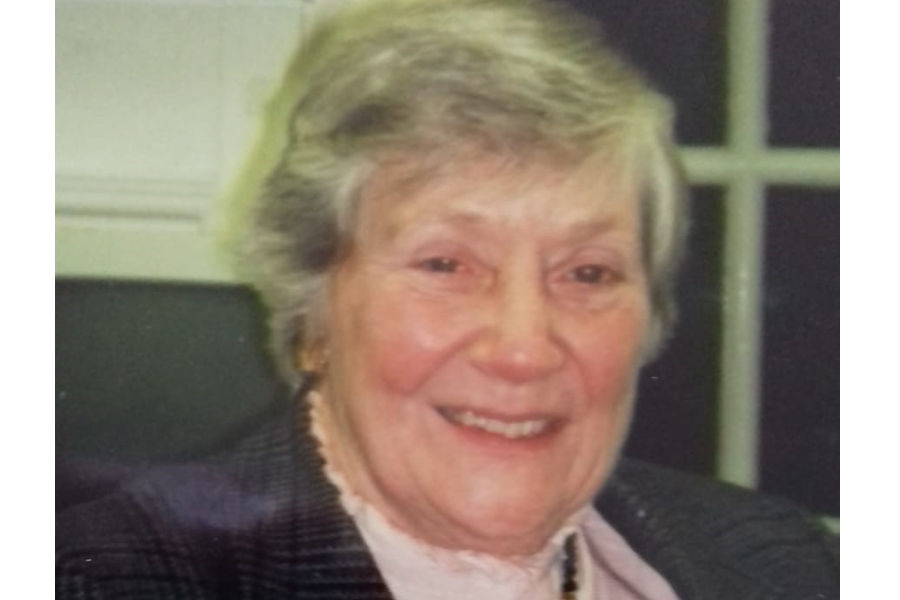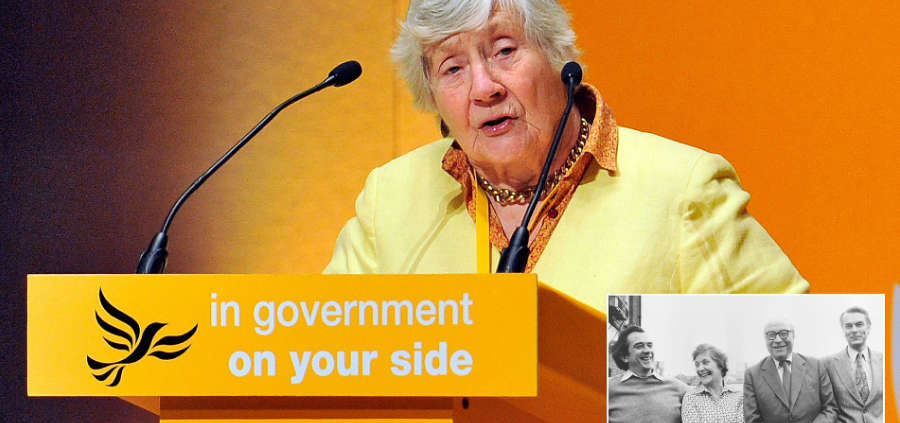A Transatlantic Politician with a Catholic Heart by Michael Ford
Even though it is more than two years since she died at the age of 90, I still miss the wisdom of Baroness Shirley Williams, one of the most influential figures in British political life, as well as a Harvard professor and a strong woman of faith.
In my work as a journalist for the BBC, I interviewed the leader of the Liberal Democrats in the House of Lords more than any other politician. A devout Catholic, she possessed a formidable intellect, common sense, and spiritual depth, along with exceptional skills as a communicator and a humanitarian.
Shirley Williams was the second child of the political scientist George Catlin, who taught at Cornell University in Ithaca, New York, and the pacifist author Vera Brittain, who wrote Testament of Youth about her experiences of the First World War. Shirley went on to become one of the highest-achieving women in British politics, noted for her work in education, social policy, consumer protection, multilateral nuclear disarmament, and international affairs.
A one-time minister in the Labour cabinet and later Education Secretary, she defected to co-found the Social Democratic Party. She was one of the so-called Gang of Four [picture inset]. “For me, British membership of the European community was so important that when the Labour Party decided to abandon it and say that we should leave the community, I found it impossible to stay in the party and to advocate it,” she told me, many years before Brexit.
An internationalist with a distinguished (Oxford) academic record (though always self-deprecating), Williams had a lifetime’s love affair with the United States. During the war, she was evacuated to St. Paul, Minnesota, where she attended the all-girls Summit School. While living in the US, she took a screen test to play Velvet Brown in the 1944 film National Velvet, a role eventually given to Elizabeth Taylor.
In later years, Williams was professor of elective politics at the John F. Kennedy School at Harvard University, a post she held for 12 years. During this time, she helped draft constitutions in Russia, Ukraine, and South Africa. She also served as director of Harvard’s Project Liberty, an initiative designed to assist the emerging democracies in Central and Eastern Europe. She was also a board member and acting director of Harvard’s Institute of Politics. Upon her elevation to the House of Lords in 1993, she returned to the United Kingdom.
Her first marriage to the moral philosopher Bernard Williams was annulled. She stated that they had “a certain jarring over judging people and Catholicism.” She later married the Harvard professor and presidential historian Richard Neustadt.
In my archive I have all our recorded conversations for the BBC, one of which she played to her students at Harvard as it complemented what she was teaching them. The last time we met, she was wearing a striking lemon-colored dress for a “Catholics in Public Life” conference in Liverpool. The relationship between politics and the media was high on my list of questions for the journalist-turned-politician. I was, however, surprised to learn that if she’d had her time over again, she probably wouldn’t have opted for a high public profile.
“Much as I love public life and politics, if I started all over again, I think it might well be the case that I might decide on a much less exposed life,” she admitted. “It’s a conclusion I’ve reached quietly by seeing what’s happened to a number of politicians that I know. I think it’s got a great deal worse in recent years.
“There is virtually no respect any longer for privacy. You might live an extremely pure life. But there’s no way that you can say that none of your children will ever have anything to do with drugs, will ever be found drunk at a party, will ever be in a situation where they drive without proper care or attention. That means they’re going to be splashed right over the front of all the tabloids—and that’s an awful lot to subject one’s family to.
“When I started in politics, I knew I was asking a lot of my family. Now I think I’d be asking more than I have the right to ask them. That’s a very serious position for good people going into public life.”
If you want to protect yourself, your privacy, and your family, don’t go anywhere near the media, Williams advised. Nowadays a national politician, or even a regional or local politician of any prominence, set themselves—and, worse, their friends and families—in a position where they’re “likely to be chopped down.” A couple of generations ago, the personal lives of politicians along with those of their family or children were not subjected to the same kind of scrutiny as politicians today.
“None of us are total saints, however good our lives may be, and for most people, it’s simply easier to opt out and say: ‘I want no further part in public life. I don’t want my private life dragged through the newspapers. I want nothing more do to with it,’” Williams once said.
Baroness Williams recalled that when she was Education Secretary and her daughter had been at school, journalists would sit at the end of the playground wall, then come up and grill teachers on whether or not she was a good student, what her grades were, how she got through her exams, or, even more alarmingly, whether she showed any signs of neurosis in class.
It was difficult to escape the piercing eye of the media, especially in the form of the tabloid press, she recalled. “I remember once, walking with a friend of mine—which is exactly what he was—and seeing a journalist behind me leap in and out of the shop doors in order no doubt to try to take a picture of him and me. God knows why since we had no relationship of that kind at all.”
On the integrity of politicians, Williams felt those who cheat the system and shame themselves are the ones remembered in people’s minds—much more than those who act honorably. There were examples on both sides of the Atlantic of politicians acting out of outstanding principle.
Williams disclosed how, during trip to America in the 1990s, she met a very senior figure in George Bush’s cabinet. From him, she learned that the president, immensely threatened by the challenge of Bill Clinton at the time, nonetheless refused outright to allow his staff to bring Clinton’s private life into the campaign. Bush made it plain that, if it happened—as it did—such behavior would be wholly against his wishes, and he would do “absolutely nothing” to support it. Baroness Williams went on: “Now, given that he was fighting a very tight race and that Mr. Clinton’s private life was already widely suspected of being rather far way away from a perfect example of Christian marriage, it was pretty remarkable that President Bush refused to let his campaign staff exploit that. Most people who look casually at politicians would never believe that could happen.”

The author of God and Caesar, who always attended Sunday Mass, Williams said politics and religion most definitely mixed. To her, politics was about the addressing of endless moral questions, and there was no doubt that her Catholicism colored her thinking. “Those questions have to be answered in the light, of course, of public opinion, though one hopes they’re not answered just in the light of public opinion. Public opinion will change. I have always found the life of politics, contrary to the way it’s usually presented, as really being a whole series of choices, and many of them are moral choices; some are pragmatic choices.”
On the subject of faith, religion, and spirituality in the 21st century, I once asked whether she felt people on the whole were more drawn to “spirituality” than membership of an organized religion or denomination.
Human beings need to belong, she replied, but also require the structure of habits and lifestyles. Without any kind of institution, that’s hard to achieve. Anarchy has always been an attractive political theory but has never worked, she pointed out: “Don’t forget Marx had this utopian view of what may lay beyond capitalism and what lay beyond communism. It was a kind of Eden where there were no institutions. Everybody lived a life of perfect harmony. No: men and women are basically aggressive, capable of great evil, unrestrained, and I fear, perhaps because I’m a politician, that you have to have an institutional structure. But it can be a light institutional structure.
“Aristotle was right: politics in the broadest sense—by which he meant the creation of institutions—is an aspect of being civilized. I think a civilized society has to have some institutional structure, and I would include in that spirituality.”
At the time of the interview, the ever-present global danger was religious fundamentalism, about which she spoke prophetically. Along with a future society which tolerated, respected, and honored a large number of different faiths would be the pull-back to a much more fundamentalist position, what she termed a “‘football supporters’ view of religion,” manifesting itself in an attitude of “This is what I am: a Protestant, a Catholic, a Muslim. I define myself in those terms. I don’t want to meet anybody who belongs to the opposite football team.”
Williams said she believed this flowed from the phenomenon of globalization. The individual feels lost in a world where people are much less secure in their ordinary lives, as their families fragment, as their jobs are no longer life-long, and as their sense of how they are valued both by themselves and by society crumble in the face of the abandonment of rank and place. “I won’t say they were good things,” she explained, “but they gave people a strong sense of where they were in society.”
Individuals, she went on, will sense this “lostness” unless they can see themselves again in a globalized society, which is mostly about economic and professional success, and to some extent looks and image too. If you can’t meet those tests—and they are “very tough tests in a very competitive world”—you are likely to try to search for a place where you belong, where you can hide away from the huge gales that cross the globalized world as all the frontiers come down.
An obvious place to hide and find yourself again, to belong and feel you matter, is in a fundamentalist religious group. “Somehow we have to address this issue of how people feel they belong in the mainstream religions,” Williams said. “Otherwise we are going to lose the whole front to the fundamentalists—and that would be a pretty tough world to live in.” ♦
Michael Ford may be contacted at hermitagewithin@gmail.com.





Leave a Reply
Want to join the discussion?Feel free to contribute!